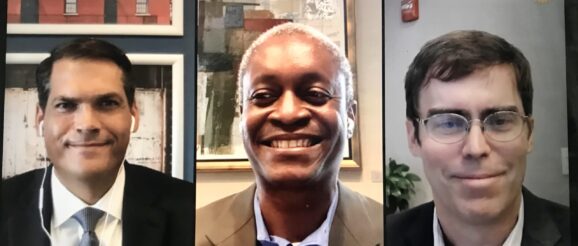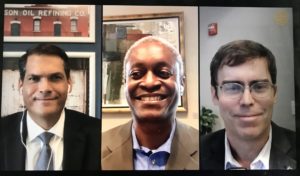Lt. Gov. Duncan hopes ‘inclusive innovation’ will make Georgia tech hub of East Coast


By Maria Saporta
It’s an ambitious goal – to make Georgia the technology hub of the East Coast.
Lt. Gov. Geoff Duncan recently announced the newly-formed Partnership for Inclusive Innovation – a public-private entity that will try to make that goal a reality.
At the Rotary Club of Atlanta on Aug. 17, Duncan announced the partnership along with one of its board members – Raphael Bostic, president of the Federal Reserve Bank of Atlanta.
Lt. Gov. Georr Duncan, Atlanta Fed President Raphael Bostin and Atlanta Rotary President Cannon Carr during virtual Rotary meeting on Aug. 17 (Photo by Maria Saporta)
“Inclusive innovation – this phrase is so powerful,” Duncan said. “We can be more successful with an inclusive atmosphere.”
For Duncan, “inclusive innovation” includes the rural areas of the state – places that often are overlooked as hubs of innovation. While Atlanta has grown into a leading technology hub, Duncan believes there are “many growth opportunities” all over the state.
For Bostic, the words “inclusive innovation” includes underserved communities – especially those with a large population of people of color, which exist in urban, suburban and rural areas of the state.
“As we build this new innovative infrastructure, we need to make sure it’s truly inclusive,” Bostic said, adding that the COVID pandemic has exposed the racial and economic inequities that exist throughout Georgia.
When pressed in an interview about Bostic’s definition of inclusive innovation was different than his, Duncan said they are “exactly the same” Inclusive means “different racial backgrounds, different income backgrounds and different geographic backgrounds,” he said.
The Partnership is an outgrowth of the Georgia Innovates Taskforce that Duncan launched in February. The Taskforce issued a series of recommendations, and Duncan created the Partnership to make sure those ideas were executed.
H.G. “Bud” Peterson, retired president of Georgia Tech who served on the Taskforce, agreed to chair the Partnership’s board, which Duncan described as a bunch of rock stars.
Board members of the Partnership for Inclusive Innovation
In an interview, Peterson said the Partnership has come up with a series of pilot programs, and it will be a statewide initiative that will seek to address universal access to broadband and technology devices as well as disparities in K-12 education and digital readiness.
Debra Lam, who runs Georgia Tech’s Smart Communities Challenge, will serve as executive director of the Partnership – now envisioned as a three-year initiative.
By comparison, the Georgia Research Alliance was established 30 years ago and has helped propel the state into an enviable position for technology among the state’s public and private research universities. It also is a public-private partnership, that includes some of the top CEOs in the state, and it has venture funds to invest in promising technologies for commercial uses.
When asked how the Partnership would fit in with established organizations like GRA, Peterson acknowledged there could be “some duplicative efforts.” But he quickly added: “There’s plenty of space for lots of people to work.”
Duncan said he wants to create “a tangible eco-system of innovation” that focuses on solving problems. The Partnership also will spend little on building an organizational structure – rather it will invest money on promising ideas and entrepreneurs.
The Partnership for Inclusive Innovation
“For us to be successful, we have got to continue to build partnerships and alliances,” Duncan said. “There’s so much opportunity out there that no one group can aggregate it all.”
Paul Bowers, president and CEO of Georgia Power who serves on both the boards of GRA and the Partnership, said the two entities complement each other.
“The entity the Lt. Governor has put in place is really an enabler. We want to have platform to allow everyone to have access,” Bowers said. “We would not be in favor of any duplication. The question is how we maximize the value of the Georgia Research Alliance.”
Anne Kaiser, Georgia Power’s vice president of community and economic development, said the Partnership will focus on pilot projects – serving as a technology incubator. Kaiser has been focused on the initiative’s rural innovation efforts. For example, the Partnership is considering awarding “mini grants” and financial incentives to support entrepreneurship and retain talent in rural communities.
“It’s all about creating jobs and economic prosperity for all people – fostering rural innovation,” Kaiser said. “There’s as much innovation going on in our rural areas as in our urban areas. It’s very organic.”
Bowers hopes the Partnership will empower groups in Georgia, such as GRA.
Partnership for Inclusive Innovation
“In its 30 years, GRA has done some magnificent things,” Bowers said. “I think the Lt. Governor’s heart is in the right spot. He wants to make sure all communities benefit.”
Still, the goal is ambitious – to become the technology hub of the East Coast. That would mean surpassing Boston, Washington, D.C., New York and Philadelphia among others.
“We have a ways to go, but I think we have some unique characteristics,” Peterson said. “We are well positioned to get much better. We have a host of assets – the CDC, the new cyber-command center in Augusta, two public universities in the top 15 nationally (Georgia Tech and University of Georgia); and we have Emory, Morehouse, Spelman…. We have a lot of things going for us.”
Duncan, however, is not intimidated by the challenge.
“We want to be an aggregator of good ideas and forge strong relationships,” Duncan said. “It is a great opportunity for us to lead nationally on some issues and internationally on some other issues.
The post Lt. Gov. Duncan hopes ‘inclusive innovation’ will make Georgia tech hub of East Coast appeared first on SaportaReport.
